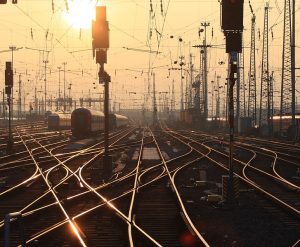While Government is an excellent machine to protect monopoly, has it ever been able to protect us against ill-disposed persons? … In establishing prisons into which multitudes of men, women, and children are thrown for a time in order to come forth infinitely worse than when they went in, does not the State maintain nurseries of vice at the expense of the tax-payers? …
On the other hand, if we analyse all the great advances made in this century – our international traffic, our industrial discoveries, our means of communication – do we find that we owe them to the State or to private enterprise? Look at the network of railways which cover Europe. At Madrid, for example, you take a ticket for St. Petersburg direct. You travel along railroads which have been constructed by millions of workers, set in motion by dozens of companies; your carriage is attached in turn to Spanish, French, Bavarian, and Russian locomotives: you travel without losing twenty minutes anywhere, and the two hundred francs which you paid in Madrid will be divided to a nicety among the companies which have combined to forward you to your destination. This line from Madrid to St. Petersburg has been constructed in small isolated branches which have been gradually connected, and direct trains are the result of an understanding which has been arrived at between twenty different companies. Of course there has been considerable friction at the outset, and at times some companies, influenced by an unenlightened egotism, have been unwilling to come to terms with the others; but, I ask, was it better to put up with this occasional friction, or to wait until some Bismarck, Napoleon, or Zengis Khan should have conquered Europe, traced the lines with a pair of compasses, and regulated the despatch of the trains? If the latter course had been adopted, we should still be in the days of stage-coaches.
The network of railways is the work of the human mind proceeding from the simple to the complex by the spontaneous efforts of the parties interested, and it is thus that all the great enterprises of our age have been undertaken. …
What thousands of examples one could cite in support of this same idea! Take all great enterprises such as the Suez Canal, the lines of Atlantic steamers, the telegraph which connects us with North and South America. Consider also that commercial organisation which enables you on rising in the morning to find bread at the baker’s … and all other things that you want at other shops. Is this the work of the State? …
If we closely scan the development of the human mind in our times we are struck by the number of associations which spring up to meet the varied requirement of the individual of our age – societies for study, for commerce, for pleasure and recreation …. To make a list of the associations which exist in Europe, volumes would be necessary, and it would be seen that there is not a single branch of human activity with which one or other does not concern itself. The State itself appeals to them in the discharge of its most important function – war; it says, “We undertake to slaughter, but we cannot take care of our victims; form a Red Cross Society to gather up the wounded on the battle. field and to take care of them.”
Let others, if they will, advocate industrial barracks, or the monastery of Authoritarian Communism; we declare that the tendency of society is in an opposite direction. We foresee millions and millions of groups freely constituting themselves for the satisfaction of all the varied needs of human beings – some of these groups organised by quarter, street, and house; others extending hands across the walls of cities, over frontiers and oceans.

